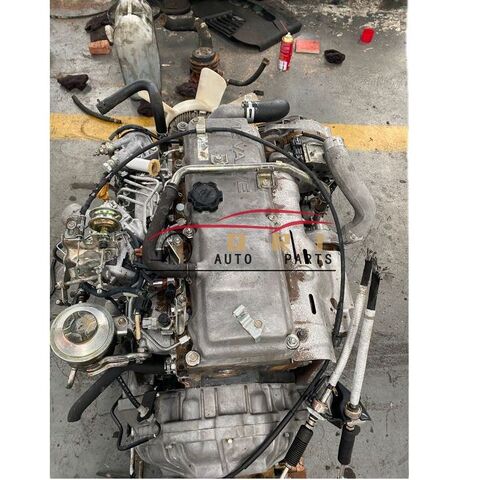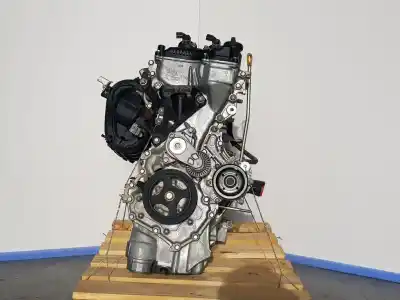Learn Why the Toyota RunX RSI Is a Popular Choice Amongst Compact Cars
Learn Why the Toyota RunX RSI Is a Popular Choice Amongst Compact Cars
Blog Article
Explore Top Quality and Worth: Your Overview to Buying a Pre-owned Engine
When thinking about the purchase of a used engine, recognizing the detailed balance between high quality and value is extremely important. A detailed examination of engine condition, background, and integrity is crucial to make sure a sound investment. By carrying out appropriate evaluations and research study, potential customers can navigate the complexities of the market a lot more effectively. The nuances of service warranty alternatives and rates approaches can considerably influence the general decision-making procedure. As you ponder these aspects, one inquiry continues to be: what details components will eventually direct your selection in this important financial investment?
Recognizing Engine Types
When considering the purchase of a second-hand engine, comprehension of the numerous engine types is vital for making an educated decision. Engines can generally be classified into two main kinds: internal combustion engines and electric engines.
On the various other hand, electric engines use electrical power saved in batteries to power the car, using a cleaner option with fewer relocating components and reduced maintenance requirements. Within these classifications, there are additionally differences, such as four-stroke versus two-stroke internal combustion engines, and different electric motor arrangements.
Understanding these distinctions is important, as they affect performance, compatibility with existing car systems, and long-lasting functional costs. By familiarizing oneself with the different kinds of engines readily available, potential buyers can much better analyze their needs and choose that line up with their car's demands and their personal choices.

Evaluating Engine Condition
A comprehensive assessment of engine condition is paramount for any individual taking into consideration the acquisition of a second-hand engine. Start with a visual inspection; look for indications of oil leakages, deterioration, or any type of physical damage to the engine block. A clean engine is commonly a sign of good upkeep techniques, while extreme grime might suggest neglect.
Following, assess the engine's parts, consisting of the timing belt, gaskets, and seals. Try to find deterioration, as these components can be pricey to replace. In addition, check out the engine installs, as damaged installs may result in vibrations and more mechanical problems.
A compression test is important to evaluate inner engine health. Uniform compression throughout all cyndrical tubes indicates a properly maintained engine, whereas considerable disparities may point to internal damages or wear.
Listening to the engine during a start-up can supply useful understandings; any type of unusual sounds, such as rattling or knocking, might recommend deeper concerns. Ultimately, when possible, demand an examination run to evaluate performance under load. By carefully analyzing these factors, possible purchasers can make educated decisions and secure a top quality second-hand engine.
Monitoring Engine Background
Comprehending the engine's background is important for making a knowledgeable acquisition. Knowledge of previous use, upkeep records, and any type of previous damages can significantly affect the engine's reliability and longevity. Begin by asking for the car identification number (VIN) or engine serial number, which permits you to map the engine's background.
Make use of available resources, such as Carfax or AutoCheck, to obtain an automobile background record. This report will certainly provide necessary understandings, consisting of crash background, service records, and previous possession details. Toyota RunX RSI. Pay certain attention to any indicators of serious damages or duplicated repair services, which may suggest underlying problems
Inquire regarding maintenance routines executed on the engine. Routine oil modifications, timing belt replacements, and other safety nets reflect accountable ownership. Additionally, ask if the engine has undergone any adjustments, as non-standard modifications can affect performance and compatibility with your car.
Finally, preferably, look for confirmation from a relied on technician that can assess the engine's condition based on its history (Toyota RunX RSI). This detailed examination will certainly aid you avoid potential challenges and make sure that your financial Recommended Site investment is sound and worthwhile
Guarantee and Return Policies
Buying a pre-owned engine usually comes with varying guarantee and return policies that can significantly affect your choice. When taking into consideration an utilized engine, it is crucial to thoroughly evaluate the warranty choices given by the seller.

In addition, respectable vendors often offer documentation that lays out the warranty and return process, ensuring openness. Constantly request this details prior to completing your purchase. A distinct service warranty and return plan can offer assurance and shield your investment, making it an integral part of the decision-making process when getting a second-hand engine.
Finding the most effective Deals
When looking for the most effective deals on a second-hand engine, it is vital to conduct complete study and contrast costs from various vendors. Beginning by checking out on-line marketplaces, automotive discussion forums, internet and neighborhood salvage backyards to collect a thorough understanding of the marketplace. Making use of price contrast devices can improve this procedure, highlighting competitive prices throughout different systems.

Think about timing your acquisition tactically. Seasonal fluctuations popular can affect prices, with certain times of the year using much better offers. In addition, be open to bargaining prices; numerous vendors may agree to lower their asking rate, especially if the engine has been detailed for an extensive period.
Conclusion
In summary, buying a second-hand engine necessitates a complete assessment of top quality and worth. Evaluating engine condition via evaluations and tests, verifying its background, and recognizing service warranty and return plans are important steps.
When considering the purchase of a second-hand engine, understanding of the various engine types is essential for making an informed choice. Engines can generally be categorized right into 2 main types: interior combustion engines and electric engines. Gasoline engines are normally lighter and rev greater, making them appropriate for efficiency cars, while diesel engines are renowned for their torque and gas effectiveness, commonly preferred in durable applications.
A thorough evaluation of engine problem is vital for any individual considering the acquisition of a pre-owned engine. Begin by asking for the vehicle recognition number (VIN) or engine serial view it now number, which enables you to trace the engine's history.
Report this page